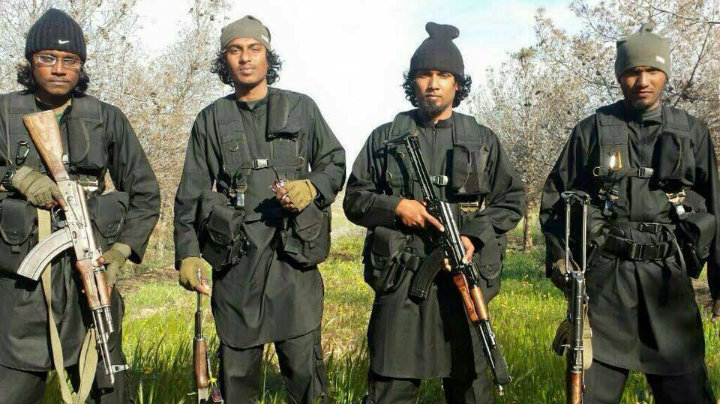The Attorney General’s Office has overhauled a first draft of a draconian anti-terrorism bill and specified some 14 offences as acts of terror, including joining or attempting to leave the Maldives to join a war in a foreign country.
The new draft, submitted to the People’s Majlis on Monday, proposes a jail term of 17-20 years for joining a foreign war. Any individual caught attempting to leave the Maldives with the same intent could be jailed for 10-15 years.
The bill also permits extensive surveillance of terror suspects.
More than a hundred Maldivians are thought to have left the Maldives to fight with Islamic State and Jabhat Al-Nusra in Syria and Iraq. The two groups are designated as terrorist organizations by the U.S.
The government has been struggling to stop the steady outflow of Maldivians joining Jihad.
A previous draft of the bill, obtained by Minivan News, granted the president the exclusive authority to declare groups as terrorist organisations. Acts of terror were previously loosely defined. Inciting violence at demonstrations, threatening the country’s independence and sovereignty, and promoting a particular political or religious ideology were considered terrorism.
The new bill, however, defines some 14 offences committed with the intent of unduly influencing the government, creating fear, or promoting ‘unlawful’ political and religious ideologies as terrorism.
These offences include murder, causing bodily harm, disappearances, kidnapping, damaging property, hijacking vehicles, endangering public health or security, damaging public infrastructure and suspending public services.
The president must consult with the national security council in designating groups as terror organisations. The list must be publicised within 15 days of the ratification of the law.
Using explosives, bullets or other weapons to cause harm, even if committed without the three motivations of terrorism, is an act of terror. This means gang violence will be considered terrorism. More than 30 people have died in gang violence over the past seven years.
Punishments range from 20-25 years for perpetrators. Planning an act of terror is punishable by 17-20 years in jail. Encouraging terrorism with direct or indirect statements is punishable by 10-15 years in jail.
Training to commit acts of terror, including learning how to use weapons or joining training camps, is punishable by 12-15 years in jail.
“We condemn terrorism. The government aims to mete out the harshest punishments for those who commit such crimes,” the AG office said in a statement.
The bill also criminalises possession of dangerous weapons, distributing publications of a terrorist organisation, and forming gangs or groups to commit acts of terror.
Fundamental rights, including the right to remain silent and access to a lawyer, can be restricted for terror suspects. Between 6-12 hours is provided to appoint a lawyer before interrogation. Meanwhile, any communications between a suspect and a lawyer for the first 96 hours after arrest must take place in the presence of a police officer.
The bill authorises the home minister to apply for a monitoring and control or ‘monicon’ order from the appellate High Court in order to tag, intercept communications and conduct surveillance on suspects.
Unlike the first draft, the new bill provides measures that the High Court must consider in issuing a monicon order and establishes some safeguards.
Judges must determine if there is sufficient evidence in a police’s intelligence report against a terror suspect and must determine if the monicon action desired is proportionate to the evidence. If the evidence is insufficient, the court must refrain from issuing the order, the bill states.
The minister does not have to inform the suspect and the court is not obliged to summon the suspect before issuing the order. However, the order must be presented to the suspect before it can be enforced.
The bill grants a suspect a 90-day period to appeal the monicon order at the High Court. The court is obliged to accept appeals of monicon orders and hold hearings.
Monicon orders last for a year and can be extended every year. Orders can be issued against minors.
The government can restrict a suspect’s place of residence, freedom of movement and monitor bank account transactions and order a suspect to undergo a rehabilitation programme under a monicon order.
If a suspect violates a monicon order, a court can jail or place them under house arrest for 18 months.
If the law is passed, the Anti- Terrorism Act of 1990 will be dissolved.
Former president Mohamed Nasheed and ex-defence minister Tholhath Ibrahim were charged under the terrorism law over the military’s detention of a judge and sentenced to 13 years and 10 years in prison, respectively, in March.
 (0)Dislikes
(0)Dislikes (0)
(0)





Laws don't mean anything when the ruling party has strong ties to gangsters who break those laws.